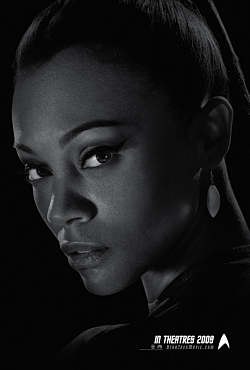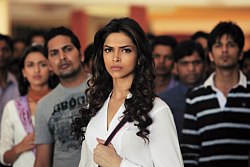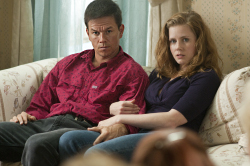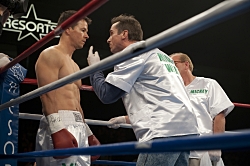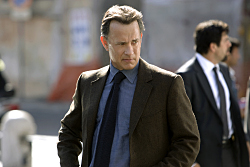For those people who’ve never seen star trek, introduce your character Uhura. Who is she and why is she on this ship?
Popular on LondonNet
Well, she’s a very important tool on the ship. She’s a translator. They’re traveling to all different kinds of galaxies and planets. So she’s an expert in linguistics. She’s able to translate and be sort of like the operator or the mediator between two commanders of two different ships from two different planets trying to meet in common so they can have safe passages. That’s a very important thing. If she gets it wrong, she can actually start a war between two nations or something. And she’s very stoic. She’s very strong. And loves what she does. And sort of takes herself a little too seriously sometimes.
I don’t know how many of these other languages you’re going to speak, but were there challenges for you linguistically? Is there a Romulan language that you had to learn?
No, no (laugh). For me, it was actually learning to speak as fast as JJ wanted us to speak because we’re saying a lot of important things. There are a lot of big words like: “The trajectory for the USS Enterprise…” And you’re just like “Brrrrrrrrrrrr”… And you’re talking so fast. And JJ is known to speak really, really fast. So he would always say in-between takes, “Zoe that was excellent, now, next take, ten times faster.” And you’re like, “I can’t believe it.” And you’re dialogue is like this long. So that was the linguistics challenge that I had (laughs).
You think in the future that society would be a little more progressive and that there would be a lot more women on board or in positions of power. Was that something interesting to you or questioning? How far have we progressed in how many hundreds of years?
No, there were many women. I didn’t look at that issue though because for some reason I automatically assumed that in the future these things would not be an issue. Maybe there were just more men per capita then women, and that’s why they were there in the flight school. I don’t know.
What about the mythology of ‘star trek’? In a lot of instances it really was pertaining to social and political themes of its time without coming out and saying we’re talking about this or that. They could use outer space metaphors, to make it easier for people to transition into it.
I think it was sort of like a poetic justice at that time. For these dreamers, which is what I believe that Gene Roddenberry was, he had this vision of what he wanted to see, as an artist, as an audience member. And he never backed down. I guess when he kept getting turned down and they said, “The only way we would do this is if it was many years into the future and in space,” he was like, OK, fine. So if that’s what I have to do in order for me to show the kind of world that I would like us to be in, then I’ll do that. And I thought it was so compassionate and so beautiful and so ahead of its time.
Were you happy to immerse yourself in the culture of ‘star trek’ after you got this part? What was that process like? Was there a star trek bible?
No. It was extensive conversations with JJ. And he had some advisors on the set that were ‘Star Trek’ advisors. I wanted to see as little as possible of the series. I was afraid of entering into a crack of mimicking the actors that were portraying these characters as opposed to just studying the characters. And as actors we’re mimics by nature. So I definitely took my time with that. After speaking to JJ and speaking to Nichelle Nichols and how they just basically said, these are the elements that we would like her to have. Under these guidelines, you can take and make Uhura however way, shape or form you want her. So I was able to kind of recreate her and picture her in school and picture her as a young person. I was always following the guidelines of the fact that she was very elegant and very sexy at times. But also it was because she was very strong and she was able to command herself in that presence and still hold court. With those guidelines, I was able to have that as a base and then just make her this and make her that. And it was a lot of fun.
But you’re playing a character, for TV fans who followed it, there’s something very specific about who these people are. So for you as an actor, how much do you need to study the history of it?
JJ wanted us to watch all the series and study the characters but he was very adamant about us not mimicking the first actors that portrayed these roles. It was not about that. Then we would have forgotten about Uhura and Spock and Kirk and everything and it would have been a William Shatner mimic. Once we had that, then there was this freedom that we could navigate. It didn’t matter what they did when they were young. They were still going to end up on the Enterprise as the original cast members, in our vision, psychologically.
Were you a Trekie?
My mom is. My great-grandmother was a diehard Trekie. But I guess I knew more about it in Spanish. When I was living in the Caribbean, it was called differently; it was like, ‘Vijae a las Estrellas’. And sometimes when they do the subtitling it’s so much more dramatic. But my mom was a huge Trekie and she was very happy when I did it. And then when I did ‘The Terminal’, Mr. Spielberg sort of gave me the Trekie documentaries for me to watch and told me what episodes to see, so that I could just have a taste of what it’s like to be a Trekie. That was my introduction into ‘Star Trek’. But I became a fan of the fans.
Have you been to a convention?
Just a little one. On Saturday, as we were flying back from Asia, we stopped in San Francisco and went to Wonder Con. And that was pretty awesome. Because, you know, back in Asia, the culture is very different. So obviously they’re all happy on the inside. Who knows what kind of buttons you push. And you’re like, “Anybody… Anybody, get that?” But then, as soon as you get off the plane in San Francisco, they’re very vocal about how they feel. I mean, there was a girl in her Trekie outfit. She looked really good too. You know, she was very expressive.
From what we see of the first introduction of Uhura in the movie, there’s definitely a sexual chemistry that plays off of her and Kirk. I don’t think that was in any of the previous incarnations. Can you talk a little bit about that? We don’t want to give too much away but what do you think that dynamic lent to the storyline?
What I love about what JJ and the writers did with ‘Star Trek’ is by recreating it they’re giving the audience an opportunity to the back-stories of who these people are before they encounter each other on the Enterprise. So they’re all meeting each other in this movie. And there’s a lot of curiosity that they have towards each other. Kirk definitely sparks a lot of intrigue, not only amongst people like Uhura, but around the entire school because he’s just so different. He takes everything just so lightly. Everybody wants to know what his deal is. And Uhura is not immune to that. If anything, the fact that he’s drawn to her bothers her. But she’s very intrigued at the same time.
How familiar were you with the other cast members prior to making this movie because for the film to really succeed there has to be a chemistry that is evocative of everybody? We have to really feel like these people are supposed to be together.
I had met Zach through mutual friends but it was years before. I was starting fresh with all the cast members. I was either a fan of their work or I was meeting them for the very first time. It was just amazing. It was perfect casting, almost, because we all got along so well. There was this synchronicity in the excitement that we all felt about this and how new it was. The fact that more than half of us were not ‘Star Trek fans’ meant we were learning together. We kind of created this energy that was growing at the same time, growing at the same pace. It was pretty cool.
Can you talk about you and Chris Pine in this movie – you seem to have a very nice connection. How was it working with him?
It was wonderful. Chris, by far, just blew me away in terms of his confidence and how he was able to jump from one thing to another. He’s a very intense actor. And I love intensity in actors when I work with them. They kind of drive you and force you out of your shell. It’s a very good thing when you just have actors that go: “I’m out. You better keep up.” And you’re like: “I’m up! I’m up!” You know, it’s really great. And those blue eyes of his, for the love of God… Jesus! The chemistry was there. . There’s definitely this overall curiosity of all these characters. Because we are meeting for the first time and we’re getting assigned on the Enterprise for the first time, it makes it very interesting.
I was wondering if you got the sense over the course of the film that people became more comfortable with their roles. I’m thinking especially of Zachary Quinto as Spock. Whether he became Spock straight away or you got the sense over time that he was becoming that? Was it a gradual transition rather than immediate?
First time I saw Zach it freaked me out. I mean, I knew Zach before because we have friends in common and everything. But not with those ears and it was amazing how similar he was to Spock, the original Spock. And then, what was worse is, to see Zachary and Leonard in the same vicinity. Freaks you out.
The guys have talked about having to go to stunt camp to learn specific skills. Was there any extracurricular activity for you?
No, no… Thank God Uhura only had a talented tongue and that’s pretty much it (laughs). So that was pretty much all I had to do. But it was a lot of fun watching the guys train. Sometimes they would train in front of us with the stunt coordinators. And just to see those fights… I loved that.
When you go on the set of a film like this, it looks artificial, nothing like what you see on film. But for you as an actor you need that reality because it is your home environment. How realistic was it for you? How much of your imagination had to be sparked?
That set was pretty awesome. In the Enterprise, the way they built it and how they thought it out, it was absolutely amazing. And yes, half of the gadgets were there just cosmetically, but half of them worked. We were just like… “Oh my God, touch that button… That button makes that sound.” It helps a lot because the more they can place you somewhere in that place where you need to be, your surroundings, the quicker it is for you to get there. And it was tons of fun. But definitely the moment you step outside we were shooting in a lot of huge green screens and it kills it for you the first two days. But once you learn to spark this, the imagination, we could make the world come to life.
How much of your imagination did you have to spark yourself? What I mean by that was where there tennis balls that you had to focus on? How do they keep you focused knowing that stuff was going to be added in later?
We had extensive conversations with JJ and the creative team. They would sometimes show us pictures of what it is that we were looking at in order for us to have an idea. Because obviously it’s a different impression according to what it is that we’re looking at. And JJ always shared that very openly with us when it came to that. “How big is this?” “Is it monstrous? Is it oppressive? Is it abundant?” He would always stop any take to answer any question. And that’s very important. Because if you have three people that are looking at the same thing but all three of us have different reactions about it, that’s going to be off. So the more we talk as a team and meet in the middle, the better it is when you do see us looking at the same thing with the same intensity.
A lot of times science fiction, for whatever reason, it’s kind of a geeky guy genre. At least people have that impression. It’s really been revolutionized in the past five to ten years. What do you think it gives women? From a female perspective, what do you think the science fiction genre offers?
When it’s well done, the quality. Stories like ‘Dune’ or ‘Alien’ or ‘Terminator’ – all these films that were ahead of their time offering women substantial roles that demanded more of their physical attention and were more relevant to the story than just: “I will find you!”
They’re usually not just the girlfriend.
No! They’re saviors. They’re missionaries. They’re going to deliver the child who is going to free the world. It’s pretty amazing.
Is it easier for an audience to accept an enemy named Romulan, than an Iraqi or a Russian? Are we too complacent with the people who look like us that maybe we’re not as threatened anymore by them?
I feel like we’re almost getting into something that’s overly analyzed. It’s a story. Sometimes you just get bored of seeing the same generic… “Oh don’t tell me, the Middle-Eastern guy is the bad guy.” “Oh, don’t tell me, so and so is the savior.” America always comes and rescues everybody. You kind of get really tired. And I think with films like sci-fi or cartoons or animation, we’re able to sort of escape those patterns that we’ve trapped ourselves in. We’re able to become limitless in terms of storytelling. It’s still the same generic simple messages that are being retold. It’s just more creative I guess. And it’s beautiful because it caters to your imagination. Our imaginations are infinite. Why should we limit them to the conventional forms of storytelling? To me, it’s either give me an escape or give me something that’s completely real. Don’t give me the in-between. That’s when it becomes unbelievable. If I’m going to see ‘Lord of The Rings’ or Sigourney Weaver in ‘Aliens’, I know what I’m setting myself up for. So therefore, you better freaking take it really far to impress me because it’s already unreal. But if it’s something real, you better have all the facts right. I like that. I like when you don’t limit yourself in terms of what it is that you’re doing.
Do you think there’s politics in a movie like this?
Always. And it makes it almost poetic. You know, it’s a very beautiful message. I don’t know if JJ and the writers were aiming for that. But obviously the same issues that they’re having in this movie would be issues that we would not be immune to right now. We’re trying to set peace with certain nations. Here, it’s humans trying to set peace with certain species. I guess it’s pretty universal.
Is space travel something that would ever be intriguing to you?
Yes! (Laughs). I mean, if anything I get really bitter about the fact that I was born in a time where I won’t be able to see technology flourish at its utmost capacity; like when we can pop in a car and the car can just take off. One day we as human beings will lose our fear of heights and we will become more in tune with altitude. One day there will be a road trip from New York to Florida in our little airplane cars. It would be just amazing. And to know that’s going to happen maybe a hundred, two hundred years from now, kind of makes me feel like I’m part of something old (laughs).
What has been for you the most impressive piece of technology that’s come into your life?
I have to say the most amazing piece of technology would be the cell phone. You can even find out if a person is unfaithful by calling them. There is no hole that I can hide in in the world where I can have the excuse that, “Oh, I’m sorry, I couldn’t get to my phone.” There’s just no way. That technology is almost scary. But at the same time it’s amazing. Yes, it ruins lives. But it also saves them. You can get to places on time. You get to talk to a friend who was considered a pen pal. You can just pick up the phone and call them and they’re all the way in South Africa. I think that’s amazing.
Let’s take Nichelle for example. She probably wore the exact same thing on episode one that she wore on episode 64. The clothes stayed the same. The uniforms are identifiable. But how much flexibility was there for you when you went in for fittings? Were there little nuances that you could add or were you stuck with ‘this is what it is.’
It depends. When you’re working with a really good costume designer, and Michael Kaplan is known for being absolutely flawless and meticulous, the outfits were just exquisite. Absolutely exquisite. And yes, there were a couple of bits here and there that I had suggested in order for comfort reasons but that didn’t tamper with the sophistication or the direction of the costumes that he and JJ had decided to do. But yeah, I did, make suggestions. “Maybe if the sleeves weren’t so long or so short…’ They were suggestions that I was able to make that really made me feel comfortable.
This is the first time her first name will ever be utilized. Apparently for all the years in the TV show and the other movies…
It was never used.
From what i understand, it’s just literally a translation of her name to a different thing. It’s not like she has a totally different name. Was there a big debate and discussion about what that first name was going to be. Are you aware of anything?
No. I guess I didn’t know that much about it. But in the Trek world it was always Nyota Uhura, right? I never knew that but JJ was the one that had shared that with me that her first name was never disclosed. It was exciting for him to kind of use that in the movie. It also gives an opportunity to get to know all the other supporting actors, from Uhura to Scotty to Sulu to Chekov. It was for us to sort of have a little depth… And for Uhura, it was definitely to disclose her first name.
It was big when it first came out in the 60s. If I’m not mistaken it was one of the first times an African American woman had ever had a major role on a TV series.
And also it was one of the first times for a woman, period, to have a significant position in a cabin… It was a military show in a way, but it was just done in space. For her to have a high rank, not only for African-American women, but just for American women in general, I think it meant so much. And I did have the honor of meeting Nichelle Nichols who basically told me, “Child, just run with it. Do whatever you want to do.” She was just the sexiest Uhura I’ve ever… (laughs). I was like, oh my God… Still, at her age, she was absolutely whimsical and beautiful. And she… And to know how her participation in the whole concept of Uhura was ever-present with the creators of Star Trek. When she walked into the auditioning room, she had a book that was called Uhuru [sp?]. And it was about African cultures. And they were so intrigued by her. She had just gotten off a plane from Paris. She was doing a one woman show. And she came in to audition for Star Trek. And they saw this book. And she just became, to them… They knew they wanted a female in the cabin, but they didn’t know exactly who. And the moment she walked in, she was Uhura. So it was just so beautiful to have the insight on that.
Zoe, did you feel you needed to absorb all that history about the Uhura character. Not just what she did on screen, but how she came to get the role and understanding that part of her?
That to me was more important than watching any episodes of ‘Star Trek’. I felt like I needed to study more of Nichelle Nichols as a person and not as an actor. There were so many qualities of who she was as an artist at that time, too, in the 60s, that transpired through Uhura, that made Uhura be so stoic and elegant and also very sensual, but commanding.
She was a fashion icon at the time.
I liked the fact that it was a space show. It was so convenient that this woman can wear very little and not be disrespected by her fellow comrades. I felt that was the one thing that resonated with me. So it didn’t matter. It meant that that environment was completely safe because there was no such thing as sexism. She could be as sexy as she wanted but still she was a lieutenant that was there to hail all frequencies. That was kind of cool for me.
You’re in these two huge movies coming out. Are you prepared for your life to change and the whole fame issue?
That’s not something that I wake up in the morning thinking about. I just really hope I can continue working with amazing directors. I did in the last two years and I was very spoiled. I want to continue that. I want to become this rotten child in Hollywood where I only get to work with amazing people that I can learn from. As for the fame, I hope that I responsibly learn to just separate that from the work.
In ‘avatar’, we know it is something really special, but I don’t really know exactly what we will see. Is it your face or it’s your voice?
It’s everything. It’s motion capture. This was petrifying to us too because this was a new technology as it came to us and we started working with it. I can’t even explain it in just a simple conversation. It’s definitely going to be the new way of making films. And it’s going to be just as impacting as when sound was introduced. And also color. It’s going to be amazing. And who else but Mr. Cameron to do it?
Which film was more difficult and more demanding, ‘avatar’ or ‘star trek’?
They both were in different scales, I guess. Because… To me it was very hard to accept the fact that I was going to do a role that had already been done before, had already been idolized.
How was it being the only girl on set?
I loved it (laughs). For some reason I always end up predominantly in roles like that. I like being the only girl.
But didn’t they give you a hard time because you’re the only girl?
I’m from New York. I know hard times. If anything, they have to keep up (laughs). That does not bother them. Which is why I guess I took Uhura as a sign too. I am drawn to female roles that are just sort of like androgynous and can sustain themselves in any environment.
Back in the day when they were making the tv series, if i remember correctly, to get some of the special effects, like the ship moving, they would tilt the camera. And the actors would have to move their bodies. But i presume nowadays it’s a little more realistic. What were some of the rigorous methods they used?
We had some of that. Look, if you’re having a cabin shake, are you going to build a $2million set that shakes? Or are you just going to grab the camera and kind of shake it and have us act like we’re drunk. There were moments of that. And that was really funny because it put us in tune with the original series and how they did it. I feel like that’s what’s going to help this ‘Star Trek’. The concept of seeing something in space, you’re already in the mindset that you need to see technology at its utmost, infinite capacity that your naked eye cannot conceive. The moment you see strings, it kills the effect and becomes like a sci-fi channel movie of the week, as opposed to a hundred million dollar movie where you go: “Oh, my God, it’s amazing with the effects.”
How did you get into acting? Do you come from a modeling background?
No. For the love of God, no but I wish. I was a classical dancer for eleven years. I went to boarding school in the Caribbean even though I was born in New York. So when I made the transition to come back to the States, I was graduating high school and I did not want to dance anymore. My mom gave me a year off but I took two. And then I told her I had a plan. What about acting? And she said okay so then I just started auditioning, like in commercials, and doing little plays.
Were you discovered somewhere or how did you go from there to here?
I was doing a play. You know you walk a fine line when you say, ‘discovered’. It wasn’t like I was sitting in the street and somebody just happened to bump into me. I was working for it. There was a manager watching the show and they signed me. You go from Burger King commercials to a Coca Cola campaign, to ‘Law And Order’, every New York actor does ‘Law and Order’. And then from there, I booked a movie called ‘Center Stage’. If it had not been for my ballet background, that would have never and so that was sort of like the first vehicle that got me an agent and then, you know, Uhura and then I’m here. I have no idea sometimes (laughs).
Do you think the fact that bob Orsi is Mexican and Alex Kurtzman grew up in Mexico has something to do to have a Latina in a huge role?
I would like to think so. But at the same time, what feels more appropriate is that I was cast based on my acting abilities and not on the fact that there was an affirmative desire from anybody in the team to be proactive about having, like, an African-American vs. a Latina or whatever. JJ had no idea that my background was New Yorican (laughs). He had no idea until he heard me speaking Spanish on set. He wants a certain ability for an artist to have and it doesn’t matter about any racial demographic. I think that is really good.


